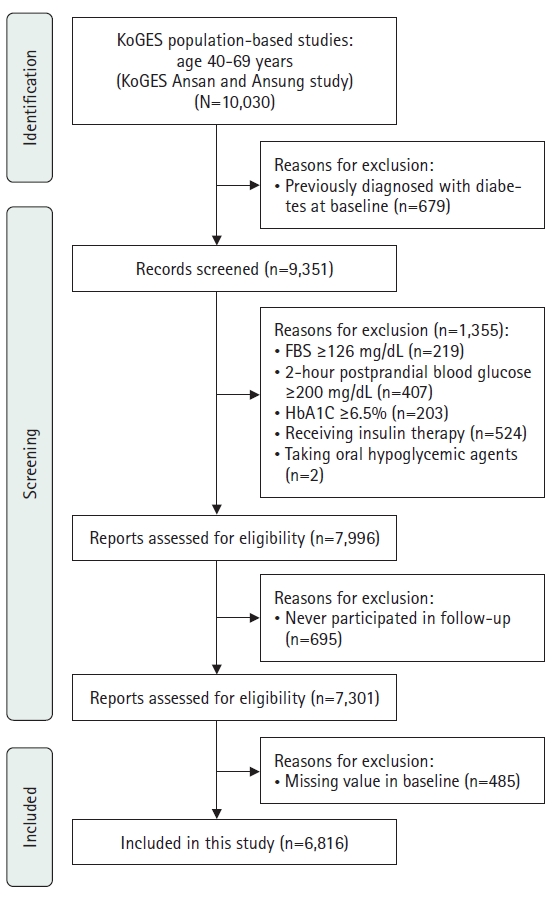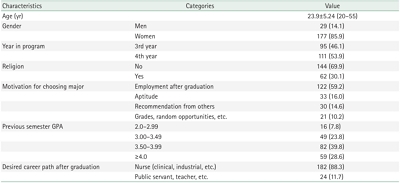-
Triglyceride-glucose parameters as predictors of diabetes mellitus incidence in Korean adults: a secondary analysis of a Prospective Cohort Study
-
Yu Jin Park, Miseon Shin, Hyun Seon Jeon, Eun Hee Yang
-
J Korean Acad Nurs 2025;55(2):205-221. Published online April 1, 2025
-
DOI: https://doi.org/10.4040/jkan.24108
-
-
 Abstract Abstract
 PDF PDF ePub ePub
- Purpose
This study aimed to evaluate the association between triglyceride-glucose (TyG)–related parameters and the incidence of diabetes mellitus in Korean adults. Data were obtained from the Korean Genome and Epidemiology Study (KoGES).
Methods
This secondary analysis examined data from 6,816 adults aged 40–69 years who participated in the KoGES from 2001 to 2020. TyG–related parameters, including the TyG index, TyG–body mass index (TyG–BMI), TyG–waist circumference (TyG–WC), and TyG–waist-to-height ratio (TyG–WHtR), were assessed. Cox proportional hazards models were employed to determine the association between these parameters and the incidence of diabetes mellitus, with adjustments made for demographic, lifestyle, and health-related characteristics.
Results
Higher levels of all TyG–related parameters were significantly associated with an increased risk of developing diabetes mellitus. Specifically, participants in the highest quartile of the TyG index, TyG–BMI, TyG–WC, and TyG–WHtR exhibited significantly higher hazard ratios for diabetes mellitus incidence compared with those in the lowest quartile (p<.001 for all). Notably, the TyG index demonstrated a stronger predictive value for diabetes mellitus than traditional measures such as the homeostatic model assessment of insulin resistance.
Conclusion
TyG–related parameters are robust predictors of diabetes mellitus incidence in Korean adults. These findings support the incorporation of TyG–related measures into clinical settings for the early identification and intervention of high-risk populations. Utilizing these parameters for early diagnosis and preventive strategies may significantly enhance diabetes mellitus management.
-
Reliability and validity of the Korean version of the Nurses Professional Values Scale-3 for nursing students: a methodological study
-
Eun Hee Yang, Mi Yu
-
J Korean Acad Nurs 2025;55(1):93-106. Published online February 20, 2025
-
DOI: https://doi.org/10.4040/jkan.24113
-
-
 Abstract Abstract
 PDF PDF ePub ePub
- Purpose
This study aimed to adapt the Nurses Professional Values Scale-3 (NPVS-3) for Korean nursing students and assess its reliability and validity.
Methods
The NPVS-3 was translated into Korean using forward and back translation with expert review. Data from 206 nursing students at four universities were analyzed to assess content, construct, discriminant, and criterion validity, as well as internal consistency.
Results
The Korean version (NPVS-3K) consisted of 21 items in three subscales: caring (eight items), activism (eight items), and professionalism (five items), explaining 60.9% of the total variance. For convergent validity, standardized coefficients for the items ranged from .56 to .81, construct reliability ranged from .89 to .95, and the average variance extracted ranged from .61 to .72. The model was validated by confirmatory factor analysis (χ2=526.00 [p<.001], χ2/degrees of freedom=2.83, standardized root mean residual=.03, goodness of fit index=.81, comparative fit index=.87, Turker Lewis index=.85). Discriminant validity was confirmed using a multi-trait and multi-item matrix. Criterion validity showed positive correlations between the three NPVS-3K factors and professional identity (factor 1: r=.40, p<.001; factor 2: r=.55, p<.001; factor 3: r=.43, p<.001). Internal consistency, as measured by Cronbach’s α, was .94 overall, with subscale values of .90 for caring, .92 for activism, and .78 for professionalism.
Conclusion
The NPVS-3K demonstrated satisfactory validity and reliability, establishing it as a valuable tool for assessing the professional values of Korean nursing students. Additionally, it can aid in developing educational strategies to strengthen these values, although further research is required to confirm its broader applicability.
-
Factors Related to Emotional Leadership in Nurses Manager: Systematic Review and Meta-Analysis
-
Se Young Jang, Chan Mi Park, Eun Hee Yang
-
J Korean Acad Nurs 2024;54(2):119-138. Published online May 31, 2024
-
DOI: https://doi.org/10.4040/jkan.24026
-
-
 Abstract Abstract
 PDF PDF
- Purpose
This study aimed to identify research trends related to emotional leadership among nurse managers by conducting a systematic literature review and meta-analysis. This study sought to derive insights that could contribute to improving emotional leadership in nursing practice.
Methods
A systematic review and meta-analysis were conducted according to the Preferred Reporting Items for Systematic Reviews and Meta-Analysis (PRISMA) and Meta-Analysis Of Observational Studies in Epidemiology (MOOSE) guidelines. Databases including PubMed, Cumulative Index to Nursing and Allied Health Literature, Scopus, Web of Science, Research Information Sharing Service, Koreanstudies Information Service System, Korean Medical Database, KoreaMed, ScienceON, and DBpia were searched to obtain papers published in English and Korean. Literature searches and screenings were conducted for the period December 1, 2023 to December 17, 2023. The effect size correlation (ESr) was calculated for each variable and the meta-analysis was performed using the statistical software SPSS 29.0, R 4.3.1.
Results
Twenty-five (four personal, six job, and fifteen organizational) relevant variables were identified through the systematic review. The results of the meta-analysis showed that the total overall effect size was ESr = .33. Job satisfaction (ESr = .40) and leader-member exchange (ESr = .75) had the largest effect size among the job and organizational-related factors.
Conclusion
Emotional leadership helps promote positive changes within organizations, improves organizational effectiveness, and increases member engagement and satisfaction. Therefore, it is considered an important strategic factor in improving organizational performance.
-
Citations
Citations to this article as recorded by  - Emotional leadership in health care: A dire need illuminated by pivotal resource cuts
Jacqueline Hoare
South African Journal of Science.2025;[Epub] CrossRef
-
3,726
View
-
193
Download
-
1
Web of Science
-
1
Crossref
|










